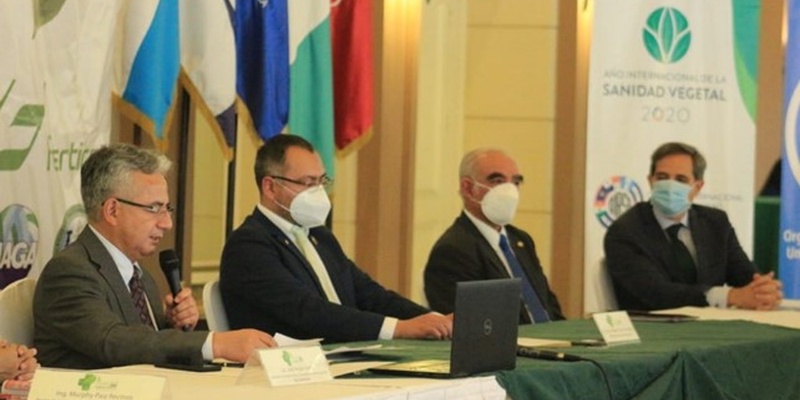The first International Congress of Plant Protection in Guatemala celebrates IYPH
Posted on Mon, 26 Oct 2020, 08:33

© Ministerio de Agricultura, Ganadería y Alimentación (MAGA)
Guatemala City, 14 October 2020 – At the occasion of the International Year of Plant Health (IYPH), the Ministry of Agriculture, Livestock and Food of Guatemala inaugurated the first International Congress of Plant Protection in the country. The event was organized by the College of Agricultural Engineers of Guatemala (CIAG) with the support of the International Regional Organization for Agricultural Health (OIRSA) and the Food and Agriculture Organization of the United Nations (FAO). The minister of agriculture of Guatemala, Mr José Ángel López, highlighted that the country is being extremely active in organizing national activities to keep promoting plant health in 2020. "Plant health must be a reality and an effort made by all countries to ensure a better world and guarantee food and the reduction of poverty," stressed the Minister.
In spite of the COVID-19 pandemic, the importance of preventing and protecting plants and agricultural products from plant pests and diseases remains of crucial importance for the country and the international phytosanitary community gathered at the first international congress of plant protection of Guatemala. According to the Ministry of Agriculture, Livestock and Food of Guatemala the fight against plant pests and diseases, such as Fusarium Tropical Race 4 and the Central American locust that are affecting plantain and banana production in the Latin American region, remains one of the top priorities in the national agenda.
Similarly, Ms Sarah Brunel, IPPC Implementation and Facilitation Unit Deputy Lead, highlighted the active role played by the IPPC Secretariat and the international community in the fight against Fusarium Tropical Race 4 and other pests and diseases affecting plant health in Latin America. She also encouraged Latin American countries to conduct and implement a Phytosanitary Capacity Evaluation (PCE) to improve their national phytosanitary systems, as successfully done by Nicaragua. In fact, the implementation of the PCE helped the country revise the Nicaraguan phytosanitary law and elaborated a new National Phytosanitary Capacity Development Strategy by consensus with all relevant stakeholders. Ms Brunel also stressed the need to keep promoting plant health and its contribution to food security, eradication of hunger and poverty, biodiversity and environmental protection. She also called upon all participants to organize IYPH activities in their countries and regions to raise awareness of the importance of plant health worldwide.
For the FAO representative in Guatemala, Mr Ricardo Rapallo, FAO and the international phytosanitary community need to strengthen efforts to mitigate the effects of climate change on plant health, which is known to facilitate the movement of plant pests and diseases to new areas creating new pathways where pests can spread and thrive. Mr Carlos Urìas, OIRSA Director, also stressed the importance of finding new solutions to combat climate change as one of the major threats to plant health at the global level. The IPPC community is working on a study on the impact of climate change on plant health to be published in 2021 as one of the key legacies of the IYPH.
In his intervention Mr Francisco Javier Trujillo Arriaga, Director of SENASICA and CPM Bureau Chair, underlined the important role played by international organizations such as the IPPC and Codex Alimentarius in facilitating safe trade in a post-pandemic world. The necessity of applying new technology and exploring innovative phytosanitary approaches was highlighted by Mr Martin Rosales, Chief of the Surveillance Department at the Istituto de Protecciòn y Sanidad Agropecuaria (IPSA), as one of the solutions to ensuring plant health globally in the future.
For further information about this event:
Guatemala fortalece acciones para la Sanidad Vegetal published by Ministerio de Agricultura, Ganadería y Alimentación
FAO participa en el Primer Congreso Internacional de Sanidad Vegetal promovido por el CIAG published by FAO Guatemala
 © Ministerio de Agricultura, Ganadería y Alimentación (MAGA)
© Ministerio de Agricultura, Ganadería y Alimentación (MAGA)

